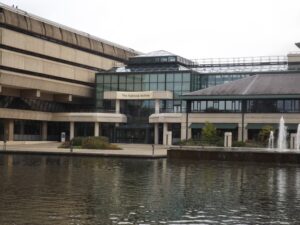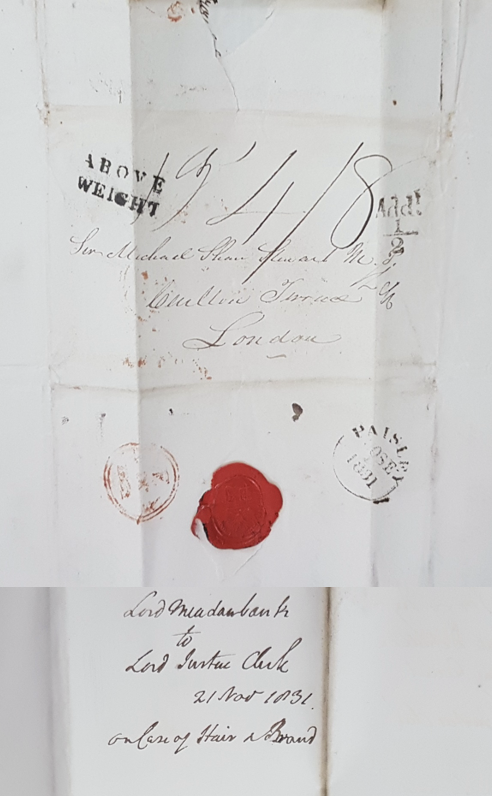Serendipity and Genealogy.

The National Archives at Kew. Image by author.
My husband and I went to The National Archives (TNA), Kew, London, several years ago as part of a visit to the United Kingdom. My husband had several documents to review, but I was unsure what I would do. It suddenly struck me I could look for documents on my only convict, Robert Bland. Robert is not my blood relative but married my great-great-grandmother, Ann Porter. I already had the court documents from Scotland, so what else could I find at TNA?
I searched for Robert’s name, and there was a record – for a petition for pardons.[1] Serendipity surely! I had never considered searching for a petition for Robert Bland and his accomplice, John Hair. Robert was a peripheral relative – only by marriage, and John was not a family member. I have the trial transcripts, which I purchased just before the National Records of Scotland allowed cameras to be used in the reading room. Sigh. These photocopied copies had cost a princely sum, but I thought this recently located petition may add to my knowledge.
So let me tell you about my findings. A letter from the clerk in the Circuit Court in Glasgow in 1831 gave details of the crime. The letter detailed that Hair and Bland had uttered three forged notes for small quantities of whisky and silver coins. A fourth note was found on Hair when they were apprehended. The prosecutor did not proceed with one charge, and both accused pleaded guilty to two charges of uttering forged notes. This same letter informed the Lordships that there were indications that Bland’s stepmother, Janet Stewart or Bland, the wife of Robert Bland, druggist, was to be indicted for a related crime.

The TNA document found. Image taken by author.
The petition itself was signed by many people, including the minister, the church’s elders, and manufacturers. The petition they signed said Janet Stewart gave the petitioners the notes and that she was ’a fraudful and deceitful woman’. They considered her more culpable than the two accused. They believed the stepmother gave the two one-pound sterling notes to her stepson and Hair, and the two men did not know they were forged notes when they exchanged them for ‘trifling purchases’. The petition’s signatories are convinced the accused were innocent, with Stewart being the guiltier party. They stated that until the trial, the accused had impeccable and respectable characters.
A letter was also included with the petition letter. It was dated 21 November 1831 from the presiding judge at the trial, Lord Meadowbank, on his behalf and that of the other justice, Lord Mackenzie. This letter made some profound statements. Meadowbank commented that the crime of uttering forged notes was highly prevalent in Glasgow and the surrounding area and that half the cases brought before the Circuit Court were of this nature. He also stated that ‘there are few crimes which are productive of greater injury to the inferior order of tradesmen’ than uttering forged notes. By this, he meant that lower-end tradesmen could least afford the loss of received forged notes. Meadowbank also stated that Bland and Hair carried out these crimes in the same manner as similar crimes committed by other criminals and that public justice needed to occur.
I have always believed (with no further evidence) that Robert’s stepmother was responsible for Bland’s involvement in this murky undertaking. My great great step-grandfather had not been in previous trouble with the authorities. I considered this positive as his wife was one of my family history heroines, Ann Bland, born Laird, later Porter.
Supporting my view, a Paisley writer said in the petition that Hair and Bland were ‘mere dupes of a deceitful woman’. The writer was another community member with an adverse view of the stepmother’s character.
Mr Boyle, a court official, wrote in November 1831 to the Under Secretary Lord Lamb stating that there were no facts in which he could recommend that the two petitioners, Robert Bland and John Hair, as ‘fit objects for Royal clemency’ for their sentences of seven years transportation. The correspondent had waited until he received a report from Lord Meadowbank, the presiding Justice of the last Glasgow Circuit, and Mr Ivory, the advocate Depute. The recommendation of no clemency eventually led to my future great-great stepfather being transported beyond the seas to New South Wales. Several decades later, he was to marry Ann Porter.
The signatories to the petition were convinced that Bland and his friend had good characters and that his stepmother was a guilty party. There is a further reference to Bland’s character on the convict Hulk Cumberland, where his character was again noted as good.[2] Bland was transported on the Heroine and arrived in New South Wales in 1833.[3] Bland’s reputation remained good when he arrived in Australia. There is no knowledge of any colonial crimes in either New South Wales or later in the colony of Queensland, and there are certainly no police or prison records after he married in Ipswich in 1870.[4] I believe Janet Stewart or Bland instigated the uttering of forged notes by her stepson and his friend.
John Hair, who had been recently married when the offences occurred, was sentenced to transportation to the West Indies. His story has not yet been discovered, but maybe serendipity will again come to my assistance.
[1] ‘Two collective petitions (the prisoners and twelve people from Paisley) on Behalf of Hair, John and Robert Bland, HO 17/14/16, 11980340, The National Archives (TNA), Kew, London.
[2] ‘Index to convict hulk, Cumberland’, Convict Hulks and Letter Books, Home Office (HO) 9, piece 1, The National Archives (TNA) Kew, ancestry.com.au; Quarterly Returns of Prisons’, December 1832, Convict Hulks, Convict Prisoners and Criminal Lunatic Asylums, Ancestry.com.au
[3] ‘NSW Government Musters and other papers relating to convict ships 1790-1849’; series CGS1155, reels 2417-2428, State Record Authority of NSW, Ancestry.com.au
[4] Marriage Certificate of Robert Bland and Ann Porter married 31 December 1870, Ipswich District, Registrar General, Queensland, Ref 1871/C/154.

Comments
Serendipity and Genealogy. — No Comments
HTML tags allowed in your comment: <a href="" title=""> <abbr title=""> <acronym title=""> <b> <blockquote cite=""> <cite> <code> <del datetime=""> <em> <i> <q cite=""> <s> <strike> <strong>